By Elliot Worsell
PART I
A decade later, it is evident that the rivalry between Carl Froch and George Groves revolved around numbers. The initial encounter promised two right hands in the first round, and six months later it concluded in round eight with a single right hand witnessed by 80,000 spectators. In the interim, Groves’ coach attributed special significance to the number six, as he believed Froch was deeply affected by the events of their first fight’s sixth round. This aversion extended to the number 31, which remains a perplexing enigma even now.
There were also other numbers of importance; increasing numbers, that is, both in terms of entourages, sponsors, and figures in various bank accounts. According to a report in the Daily Mail, the 2014 rematch between Froch and Groves was at the time declared the highest-grossing fight on British soil in history, with the largest ever purse: £10million. (Froch taking home £8m and Groves £2m.) In addition, the newspaper’s analysis of the finances showed that the total income from the night was more than £22m, more than any other fight in Britain, while the official Wembley Stadium crowd of 77,000 – rounded up at every turn by Carl Froch – beat the previous British record of just over 70,000, set in 1933 when Jack Petersen beat Jack Doyle at White City. Gate receipts were reported as £6m, and the pay-per-view sales on Sky Sports Box Office surpassed the 900,000 mark, ensuring, at a price of £16.95, the event would provide a UK take of just over £15m. The international television take, meanwhile, was around $1m (£580,000), and then there was sponsorship, which poured around £250,000 into the pot, and merchandise and hospitality sales, which added £250,000 to a grand total of £22.3m.
As crazy as it sounds now, there had once been a feeling that Froch was reluctant to take the rematch. Such was the nature of their first fight, you see, a fight shrouded in controversy, many believed that he would avoid Groves almost just to spite him and that, had it not been for the IBF getting involved and ordering a rematch, it may have never happened at all.
Despite facing scrutiny, Froch remained determined to settle the score. Not only that, but the Nottingham native would also beat Groves to the punch by being the first to arrive at Wembley Stadium on May 31, 2014.
As soon as the IBF and WBA champion’s car arrived at the stadium that evening, he confidently emerged, took a sip from a plastic bottle of water, and decided to wander instead of heading to his changing room. With each step, Froch slowly discovered a gap between two stands, revealing a view of red seats and the increasing noise of the crowd. Suddenly, as he appeared on the big screens, the crowd’s roar intensified. However, instead of a warm welcome, Froch saw a disturbing image of rotten teeth on the screen, accompanied by the boos of the fans. Disheartened, the champion turned away and sought solace in the peace of his changing room.
Arriving a little later at 7.50 pm, Groves made a deliberate choice to not check the crowd anticipating violence in a few hours. Instead, he focused on creating a sense of privacy by covering the cameras in his changing room with towels or blue tape, alongside his team. In contrast, Froch left the cameras untouched, allowing Sky Sports, the fight’s UK broadcaster, to observe his backstage activities. Looking back, this could be seen as either an oversight on Froch’s part or a reflection of his complete ease with the situation.
Just twenty-four hours ago, the away dressing room was bustling with Peruvian footballers preparing for a friendly match against England. The sheer size of the room was overwhelming, especially considering the sudden transition from football to boxing. It was a space usually occupied by a whole team, but now it accommodated only a lone boxer and his small, but steadily growing, entourage. The presence of numerous numbered pegs along the walls, used to hang jerseys on game days, served as a reminder of the transformation. Additionally, physio tables were present, usually employed to treat the tired limbs of highly paid stars. In one corner, a flip chart stood, typically used by managers to strategize and devise tactics to defeat their opponents, with a marker pen at the ready.
Upon his arrival, Paddy Fitzpatrick, who would go on to repeat the same act, began shadowboxing in the center of the room. His eyes gleamed with excitement as he shouted, seemingly without any cause, “Vaya con dios! Vaya con dios!” Instantly, everyone else’s faces lit up, tensions eased, and their rigid bodies relaxed. They were given permission to embrace enjoyment amidst their apprehension.
However, for Sophie Groves, there was more than meets the eye when she walked into the room at 8:04 pm. With a purposeful stride, she made a beeline for her husband, who was seated on a bench, and planted a tender kiss on his lips. It was a gesture that brought her solace, a welcome respite from the challenges she faced. “This place feels pleasant,” she murmured softly.
“Yeah,” replied Groves. “Lovely and big.”
“Mother is well, Father is well. Everyone up there in the Royal Box is content. Abundance of beverages is available.”
In that moment, George’s smile was exclusively reserved for her, a smile that no one else could ever capture.
“Is Garvey up der?” asked Fitzpatrick.
Sophie commented, “Indeed, he appears to be quite impressive. He has a sharp sense of style, catching the attention of my friend.”
Inform her that he is already in a committed relationship. He has a wife and a few children. Please refrain from disrupting my youthful years.
With a smirk, Groves added, “But most importantly, he has a promising career.”
Aware of his surroundings, the super-middleweight got up from the bench and checked his speakers. He then started fiddling with his phone, making adjustments to the pre-planned playlist for the evening. Soon enough, the first song, “The Spell” by Alphabeat, began to play. Sophie, finding herself momentarily alone, battled with overwhelming emotions while staying seated on the bench. To regain composure or keep her hands steady, she decided to apply some lipstick.
Groves addressed both his wife and trainer, stating firmly, “This is the final count. No additional individuals are required to enter this space.”
His wife quickly mentioned a few people eager to visit the changing room later, but Groves, unsure if he would still be himself by then, seemed uninterested in what she had to say for once. The idea of thinking that far ahead felt dangerously presumptuous, futile, and tempting fate.
Both of them were aware that all they had in that moment was the present. At 8:09 pm, Groves leaned his head on his wife’s shoulder, indicating that he, the boxer, was the one yearning to release his emotions. They derived strength from one another, as if only her shoulder was preventing the boxer from falling apart. The tears were held back, restrained by the mundane conversation they engaged in, discussing clothes and hair. “You look incredible,” he complimented her.
Groves had candidly confided in me three days ago, expressing the intense emotional rollercoaster he experiences before every fight. He admitted that he teeters on the brink of tears in the changing room as the fight approaches, attributing it to various triggers. Whether it’s a song, a phrase, a face, or even a text, anything has the potential to set him off. As long as he manages to regain control, he assures himself that he’ll be alright. Yet, this feeling of emotional vulnerability always lingers within him.
In the end, I am the one who fights. I will always remember this fact. It may sound ignorant and harsh, but I am the one who endures the blows. When everything falls apart, regardless of whether others care about me or not, I am the one who carries the burden. And that is the most difficult part. I am grateful for everyone who supports me, but to some extent, I wish I could keep them all at a distance.
It was a necessary self-centeredness, perhaps, with begrudging acceptance from those who saw it as essential to his profession. Furthermore, there was an undeniable courage in this self-awareness and honesty, which, as one discovers, is a trait that remains untarnished by time, changing circumstances, or newfound wisdom and maturity of observers. While a boxer’s intelligence or morality may be reevaluated over time, their bravery is never questioned or undermined in the same way. A boxer’s bravery is a rare valor that is not commonly encountered. The bravery shown by a ten-year-old boxer, whether in a fight or simply in preparation for one, is a kind of courage that most individuals never display in their entire lives. In this particular case, George Groves demonstrated unparalleled courage by simply keeping himself composed before a fight in front of 80,000 fans. His bravery was extraordinary even in the world where he is known, celebrated, and respected.
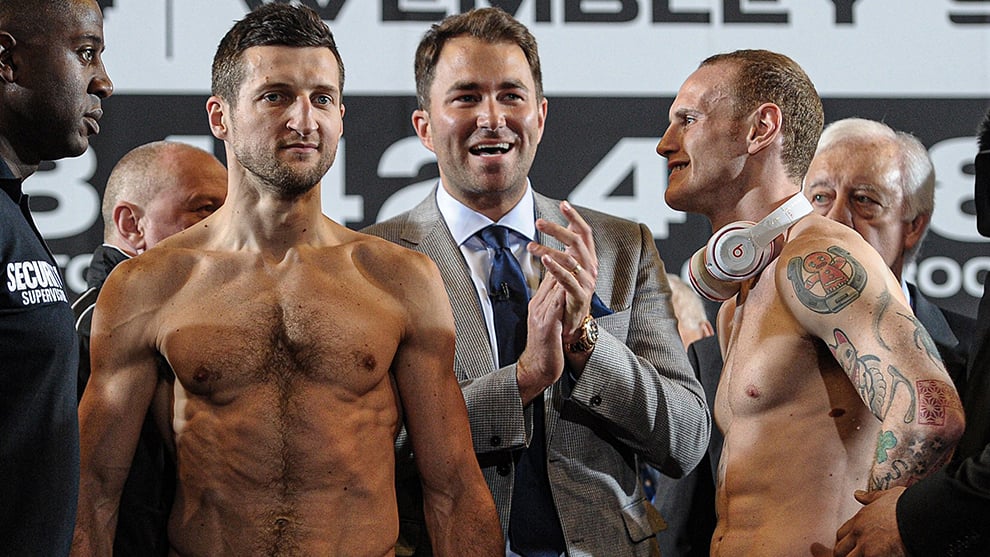
Froch and Groves step on the weighing scales (CARL COURT/AFP via Getty Images)
PART II
At 8.12 pm, two metal chairs were dragged into the room by Barry O’Connell, a strength and conditioning coach, whereupon the boxer whose hands were soon to be wrapped made sure they were positioned back-to-back. He then sat on one of the two chairs and rested both his weapons on the bridge between them as his trainer, Paddy Fitzpatrick, stood over him and began the process of wrapping. As ever, and owing largely to superstition, the right fist was the first to be wrapped and George Groves, once happy, moved this fist towards the onlooking inspector. “No, no, you do both first,” he said. “Then I’ll sign them.”
Fitzpatrick took one of the many tape strips hanging from a nearby table and began wrapping it around his boxer’s left fist. The process came to him effortlessly, as if it were second nature. As he worked, he stole a quick glance at the television screen, which displayed footage of a fight between Kevin Mitchell and Ghislain Maduma. Pondering the situation, Fitzpatrick mused aloud, “Did Mitchell really miss the check weigh-in this morning?”
“Yep,” Groves remarked. “I have no clue how he did it. It’s not exactly difficult to gain weight. He must’ve packed on over ten pounds in a single night.”
“Does this mean it’s no longer an eliminator?”
Lee Meager, the individual dispatched by the Froch camp, interjected, remarking, “Although it remains an eliminator, it pertains solely to the African.”
“Oh, I see,” responded Paddy. “So, did you catch a glimpse of Anthony Joshua? Was he any good?”
“Yes, but it’s still a baby and could use some exercise.”
“First round?”
“Yeah.”
Groves swiftly finished by 8.29 pm, extending his wrapped fists towards Meager and the inspector. Meager placed his hands on Groves’ fists and nodded in agreement, while the inspector marked “BBBOFC” on each of the casts. Fitzpatrick spoke up, asking if it was alright for him to step outside and explore for a bit.
Groves, enjoying the absence of his trainer, filled the silence with the upbeat song “Loose Fit” by the Happy Mondays. Nodding his head along to the rhythm, he shifted his attention towards the television where Mitchell was successfully stopping a troubled Maduma in the 11th round. Engrossed in the fight, Groves remained quiet, taking occasional sips from his water bottle while listening to the enthusiastic advice of his new promoter, Kalle Sauerland. Though Sauerland’s words were more significant to himself than to Groves, the boxer seemed more interested in his phone and the playlists it held. Using the music as a distraction from the screen and the mindless chatter around him, Groves located “Electric Feel” by MGMT and decided to make another trip to the bathroom, taking along a pair of Calvin Klein boxer shorts from his suitcase. In an instant, he and the doctor vanished once more.
Now down to just his boxers and a T-shirt, Groves, upon his return, sat on a chair and put on a pair of black Puma socks. He then slipped his right foot into a white and blue boxing boot and pulled the laces tight. Real tight. However, rather than go on to tie them, he just as soon stopped, got to his feet, and rushed to fetch his suitcase by the far wall. Pulling from it his wedding ring, he retreated once more, this time holding the ring in his mouth. “I was going to remind you,” said Phil Sharkey, who, having been snapping away behind his camera, would now watch Groves release the wedding ring down the blue lace of his left boot and wait for it to settle. Only then did he start to cross his hands and secure his foot in the boot. Only then was balance restored.
Fitzpatrick entered the room once again and noticed James DeGale, Groves’ former rival, appearing on the television screen. Fitzpatrick only managed a sly grin upon seeing him, while Groves, though distracted, one-upped him by muttering “ah-ha”. Groves then observed his former gym mate pacing the ring before his fight against American Brandon Gonzales, but his interest ended there. In fact, Groves didn’t care about the outcome of the fight at all. He soon turned his attention away from DeGale completely, kissed his gold boxing gloves necklace, and nodded repeatedly to the song “I Wanna Be Adored” by The Stone Roses.
Finally, at 8.50 pm, the long-awaited visitor Charlie Fitch arrived, not DeGale. He was the one they had all been anticipating. It had been eighteen months since Fitch had last officiated a world title fight. Despite his relative inexperience as a 43-year-old referee from Syracuse, New York, Fitch unexpectedly found himself in the challenger’s changing room. He understood the significance of his role in this particular rivalry, as well as the historical context. Furthermore, Fitch was well aware of the fate that had befallen his predecessor.
As a group of men gathered around him, an inspector informed Groves, “I am your referee, Charlie Fitch.” Subsequently, handshakes were exchanged, the music was lowered, and the spotlight in the room briefly shifted.
Fitch addressed the group, flanked by Groves in boxer shorts and a T-shirt on his right, and Fitzpatrick on his left. “Tonight, we will go over the regulations for the fight,” he began. “Both of you are championship fighters competing in a title match. Remember, there will be no ‘saved by the bell’ clause in any round. This means that if a fighter is knocked down and the bell rings, they will lose by knockout if they fail to get up before I count to ten. In such a situation, the trainer must refrain from entering the ring until I decide whether to stop the fight or let it continue.”
“The three-knockdown rule is not in effect, meaning if a fighter goes down three times in the same round, it will be at my discretion whether I stop the fight or allow it to continue. If a fighter gets hurt, but I can see he’s able to continue, I’ll let it go. Be careful with headbutts. I’ll look for any on the inside. And I don’t want to see any punches behind the head. The protector should be low enough so that I can see the navel. Punches above the beltline are okay. Anything below that beltline will be ruled a low blow. Can I see the protector?”
Fitzpatrick promptly grabbed the fighter’s protector from a nearby table and handed it to the referee. “This one’s top-notch,” Fitch remarked, caressing the leather and appreciating its quality. “It’s fine if it sits slightly below the navel.” He turned his attention back to Groves. “In the event of a knockdown, head to the farthest neutral corner. If you find yourselves locked in a clinch, I expect you to find a way out. You can either punch your way out or maneuver away from the clinch. If I notice that you’re unable to resolve the clinch, I will command ‘break!’. Once I give the order, you must stop punching and separate. I want a fair fight. You both understand how to fight fairly, and these fans are here to witness a good, sportsmanlike bout.”
Fitzpatrick inquired, “Can I pose a question?”
“Yes.”
“What will be your response when someone punches you in the back of the head?”
From Fitch’s unmistakable expression, it was evident that he anticipated the upcoming scenario, thus he had already prepared his countermeasure. “The outcome will be contingent upon the circumstances,” he remarked. “The fighter may receive a gentle caution or a more severe one. I might intervene by pausing the match, approaching the fighter, and advising them not to strike behind the head without deducting any points, or alternatively, I may promptly pause the match, gather them at the center of the ring, and deduct a point. Depending on the situation, I will exercise sound judgment and make the appropriate decision at the appropriate moment.”
“Any other questions?” asked the inspector.
Fitzpatrick responded, “No, just the one I inquired about, thank you.”
Fitch extended his hand to Groves, shaking it firmly. “Wishing you good luck, my friend,” he uttered.
Afterward, Fitzpatrick withdrew his hands from his hips, approached the flip chart in the room, and grabbed a pen. It seemed as if he was about to delve into the intricacies of the 4-3-3 formation, both in terms of possession and lack thereof. He started by jotting down bullet points on an A3 paper. The words “Mongoose,” “31,” and “Dis-arm” were quickly written down. Then, he paused briefly, running his hand over his goatee beard. He motioned for Barry O’Connell to come over and join him. They engaged in a conversation for a minute or so, after which the phrases “Religeous” and “Teach” were added to the sheet, with the former being spelled incorrectly.
Unsatisfied with that, another sheet was promptly attached to the wall using masking tape. On this new sheet, Fitzpatrick proceeded to sketch a sizable circle containing the number “6” within it. Above the circle, he inscribed the words “Vaya Con Dios,” while at the bottom he wrote “No Ego.” On each side of the circle, he also misspelled the word “Rhythm.” Meanwhile, on his third and last sheet, Fitzpatrick simply penned the name “JAMES TONEY” and underlined it multiple times. Proudly, just like Toney, he stepped back to admire his own creation.
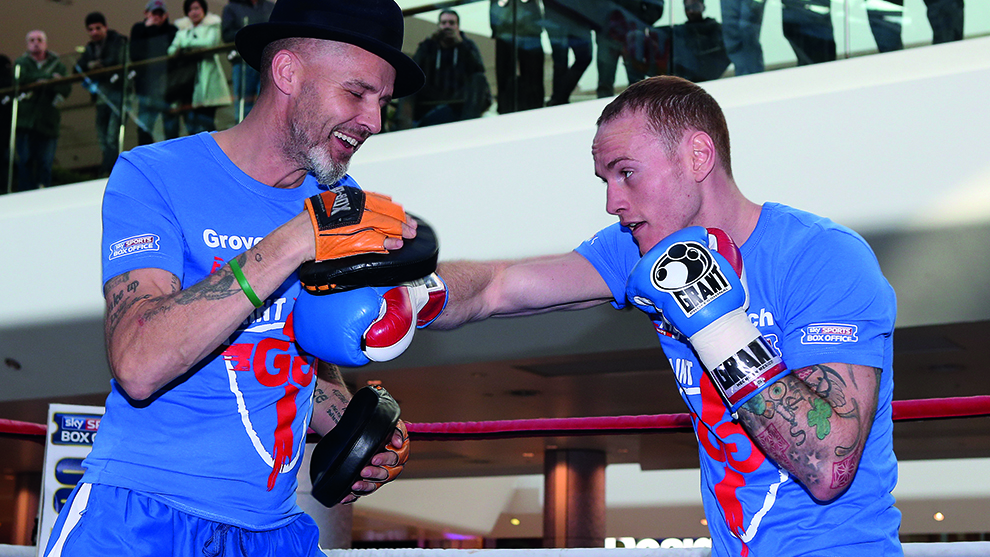
Jan Kruger/Getty Images captures Fitzpatrick assisting Groves by holding the pads.
PART III
In a sprawling changing room located further down the corridor, Carl Froch engaged in a bout of skipping to keep his body warm and build up a sweat before his training session with Robert McCracken. Reflecting on his previous experience facing George Groves in November, Froch admitted that he had entered the ring feeling chilly and lacking in moisture, as he had only performed a few punches on the pads. Determined not to repeat the same error, he recognized the significance of skipping as an integral step in his preparation.
On the contrary, his opponent had no intention of skipping. Skipping before a fight was not a practice he had ever engaged in, so he saw no reason to start now. Instead, while Froch skipped to warm up, Groves opted to sing along to Jimi Hendrix’s “All Along the Watchtower,” casually spitting in the direction of the door. He then turned to his lawyer, Neil Sibley, and asked if he could find some bananas. After passing his headphones to his old kickboxing coach, Jason Stevens, Groves stretched against a table, executing high-kicks, low-kicks, and side-kicks. By 9:21 pm, he had put on his groin protector and adjusted his Union Jack fight trunks for optimal comfort.
Fitzpatrick inquired, “At what time would you like to put on your gloves?”
“Do we have thirty minutes left?” Groves inquired, seeking confirmation from Barry O’Connell. Barry, certain of the timeframe, nodded in agreement. With that settled, Groves informed the doctor, “I’ll go check myself in the mirror,” initiating another comedic rush reminiscent of the Marx Brothers towards the bathroom.
Amused by the scene, Fitzpatrick shouted “vaya con dios!” and welcomed into the room Mick Williamson, the cuts man, who had just witnessed James DeGale stop Brandon Gonzales in four rounds. “Not sure about the stoppage,” said Williamson, laughing. “DeGale boxed well, but it was quick. Let’s just say that.”
After Fitzpatrick rolled his eyes, a lingering unease seemed to shadow him, possibly due to an incident that took place in November. However, as soon as Groves returned from the bathroom, Fitzpatrick skillfully concealed any trace of that incident ever happening.
The boxer exclaimed, “I’ve been told that DeGale emerged victorious!”
“By stoppage,” confirmed his coach.
The inspector returned at 9:28 pm, this time carrying a set of blue Grant boxing gloves. Groves, aware that these gloves would soon be used for violence, attempted to shift the atmosphere in the room by replacing Tweet’s “Oops (Oh My)” with the more aggressive “Sail” by Awolnation. As he covered his right hand with one of the gloves, he quietly mumbled, “Blame it on my A.D.D., baby…”
“Nice?” said Fitzpatrick.
“Nice,” replied Groves.
“Niiiiiiice.”
At 9:32 pm, the inspector signed both gloves as the left one followed suit. However, seven minutes later, Groves came to the realization that wearing gloves before the intended action had its limitations. Consequently, he lost control over his phone and, subsequently, the atmosphere in the room. Handing me his phone, he said, “You want the ‘sprints’ playlist? Just press play.”
The initial tune that filled the room was “Hounds of Love” by The Futureheads. Groves, fully immersed in the music, responded energetically by throwing a series of powerful punches towards Fitzpatrick’s pads. In the midst of these punch combinations, Mick Williamson took hold of a container of Vaseline and carefully spread the petroleum jelly around Groves’ eyebrows, ears, forehead, cheeks, and chin. To conclude the preparation, he gently slapped Groves’ arms and handed him a bottle of water. Groves, taking a quick sip, then inquired, “Could you possibly locate ‘Dirty Diana’?”
Recognizing the necessity to restore balance, I swiftly navigated through the boxer’s phone music library. Once the song was located, I pressed play without hesitation. However, much to my dismay, the Arctic Monkeys’ “R U Mine” continued to overpower the room.
Despite being aware of the situation, Groves persisted in throwing punches. However, I could sense his gaze shifting towards me, accompanied by a growing dissatisfaction. To make matters worse, the demands for him to vacate the changing room were becoming louder and more frequent. Even Fitzpatrick, his own coach, had begun questioning his readiness. There was no doubt about it, it was time for him to go. Yet, there lingered a suspicion that Groves couldn’t depart until he had listened to a specific song. This particular tune was an integral part of his routine, a vital component of his ritual, and an essential part of his identity.
Continuing my futile search, I made the foolish decision to hit the stop button, resulting in complete silence except for the rhythmic thuds of gloves striking pads. “Elliot, play that song,” Groves requested amidst his punches, which ultimately prompted me to clarify the problem and led Groves to investigate, only to realize that he hadn’t even downloaded the desired song yet. “Fine,” he conceded. “Instead, play ‘PYT’.”
Groves was unaware that outside his changing room, several officials from Wembley Stadium and Sky Sports were ready to forcefully remove him from hiding. Additionally, Eddie Hearn, the event’s promoter, had arrived in a state of frustration, emphasizing the strict curfew time of 10.30 pm set by Transport for London. Meanwhile, pundits and commentators speculated that Groves’ actions were a strategic maneuver, playing mind games and employing stalling tactics, as he had extensively focused on psychological warfare in the preceding months.
Yet the reality is, the minor hold-up that night owed to nothing of the sort. Instead, if looking to blame anyone, blame it on my inability to complete a simple task. Or, better still, blame it on the boogie, for it was only once he had heard Michael Jackson sing that George Groves felt ready, properly ready, to leave.
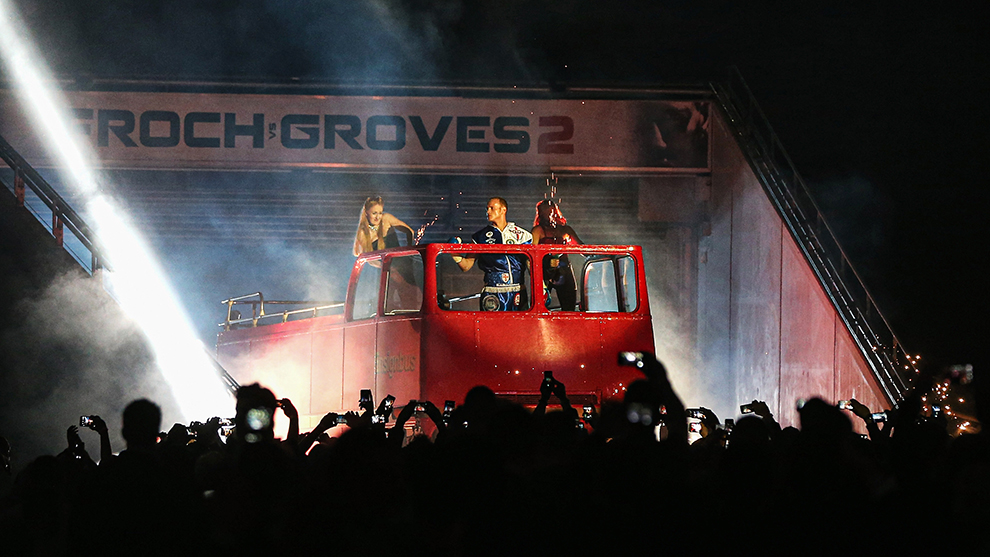
George Groves hops on a bus that transports him to the boxing ring.
PART IV
The challenger, snarling and spitting, dashed down the corridor at 9:46 pm, determined to ignore anyone who dared obstruct his path. His sole mission was to catch the bus he was running late for.
“Sure, it sounds great to say, ‘This is what I’ve always dreamt of since I was a child,’ but honestly, I couldn’t care less about all that nonsense,” he had shared with me three days ago. “For the past eight weeks, it’s been a matter of life and death. The world title means absolutely nothing to me at this moment. Even the money doesn’t really matter. All I want is to come out on top. All I want is to win.”
George Groves, now accompanied by a group of imposing bodyguards and a considerably larger team than before, paid no attention to any of them as he barely made it in time to the parking lot of Wembley Stadium. Despite standing right in front of a grand, red, double-decker bus organized specially for him by his new management company, he failed to grasp the utter ridiculousness of the upcoming event.
As Groves boarded the bus, the ignored individuals quietly retreated into the shadows. Walking ahead of him, they soon found themselves amidst a cacophony of noise and a sea of expectant faces. It was evident that the 80,000 fans craved one thing above all else: violence. They desired a ruthless and definitive conclusion, and it seemed they didn’t particularly care about the outcome. The voices from the crowd alternated between commanding Groves to “give him hell!” and threatening him with a devastating defeat.
As the bus gradually moved forward, its hesitant entrance into the stadium perfectly mirrored the uncertainty felt by everyone involved. At this point, fans were greeted with not only the peculiar sight of George Groves standing on the bus’s top deck, but also surrounded by fire jugglers and go-go girls, creating a surreal setup that even David Lynch would find too bizarre. It was an unprecedented ring entrance, choreographed by the boxer himself, which had cost over £50,000 of the budget, as insisted by the challenger. As Kasabian’s “Underdog” played in the background, Groves descended to ground level, confidently striding down a short red carpet. The introduction of Prodigy’s “Spitfire” served as a reminder to all that a fight was about to take place.
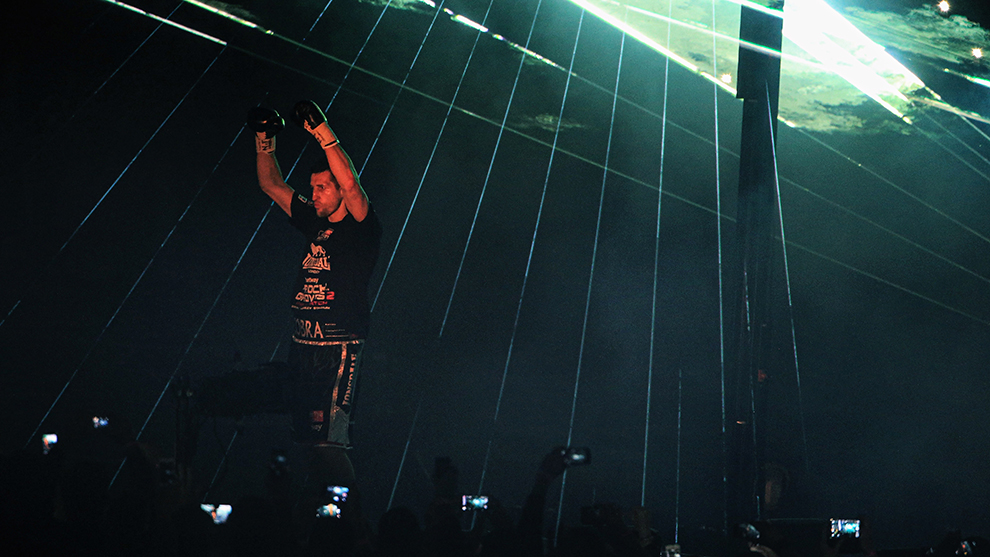
Matthew Lewis/Getty Images captures Froch as he embarks on his journey.
In contrast to Groves’ grand entrance, Froch’s was much more understated. There were no double-decker buses or fireballs involved. The champion simply walked out to Queen’s “We Will Rock You”, a song that always gets the crowd pumped up and stops them from booing. He then made his way to the elevated platform while AC/DC’s “Shoot to Thrill” played in the background. A dazzling lightshow followed, with lasers shooting vibrant colors all around him. Although Froch probably didn’t enjoy the theatrics, he started shadowboxing nonetheless.
“Eddie Hearn, the event’s promoter, acknowledged the immense dedication put forth by George Groves and his team during the ring walks. Countless meetings took place at Wembley in the weeks leading up to the event, highlighting its magnitude and the potential to become overwhelmed. This is precisely why it is crucial to have a reliable team that can be entrusted to handle such matters. Unlike others, Carl Froch prefers to focus on his training and would rather spar for 12 rounds than obsess over ring-walk music. This quality is what makes him admirable; he is known for his warrior spirit, his toughness, and his willingness to take on any opponent. It is not about extravagant ring walks or flashy entrances for him; that is not the kind of person he is.”
Froch, on the other hand, was not interested in trivial matters. Buses, acrobats, and even music didn’t capture his attention. It is said that Matchroom’s head of media, Anthony Leaver, had to persuade Froch to have any music at all. Leaver resorted to playing songs over the phone, hoping that Froch would find one he liked. Eventually, he did find one, but then came the overthinking. Froch decided against using AC/DC’s “Highway to Hell” because he didn’t want his boxing ring, his ultimate destination that May night, to symbolize hell. He enjoyed the song, but not its message. As a result, it was replaced with “Shoot to Thrill,” a track and sentiment that better matched Froch’s fighting ethos.
In a similar fashion, Froch adopted a strategy inspired by John Pearce, a relatively unknown former Commonwealth Games gold medallist from Middlesborough. Pearce had successfully employed the same tactic against Froch in an ABA semi-final, leaving a lasting impression on him. Consequently, Froch entered the ring and presented nothing more than his back to Groves, completely disregarding the challenger’s intense gaze. However, when it was time for the introductions and Froch removed his T-shirt, he finally turned around to face the center of the ring. It was only then that their eyes met, as referee Charlie Fitch gathered them together and reminded them of the rules. He instructed them to touch gloves and commence fighting when the bell rang.
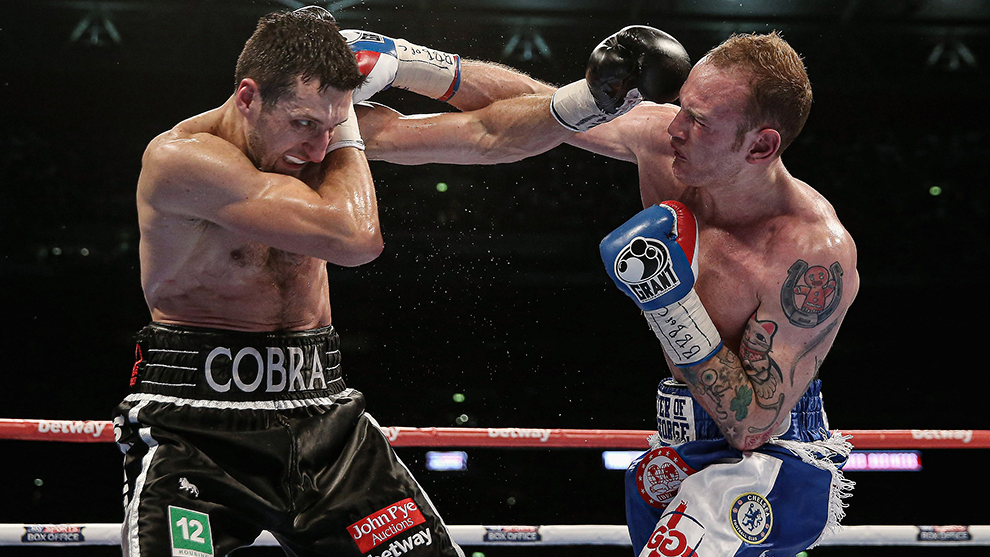
Froch and Groves trade blows in a punch exchange.
PART V
He described the finishing right hand as the best shot he had ever thrown in his life, unsure if it would be his last. Carl Froch explained how he backed his opponent into the ropes, prompting him to try a left hook that he had boasted about. Froch cleverly faked a left hook and then delivered a powerful right hand. Although the left hook had no force behind it, George Groves attempted a check-hook when the right hand was thrown. Unfortunately for him, this left his chin vulnerable and exposed, and with no escape due to being against the ropes. Froch had confidence that the punch would connect even before he threw it, as it was perfectly aligned. Groves could have evaded it, but the timing did not allow him to do so.
“It was one of those punches where I was so relaxed when I threw it. I had my feet under me, the centre of gravity was perfect, and I just threw the punch without thinking too much about trying to knock him out. I just wanted to land the punch. It wasn’t until I dropped him that I knew he wasn’t getting up. I just thought, Yeah that hurt. But then I saw him on the floor with his ankle around the back of his neck and I thought, He’s in trouble here. He’s not going to beat the count. And if he does, it’s game over.”
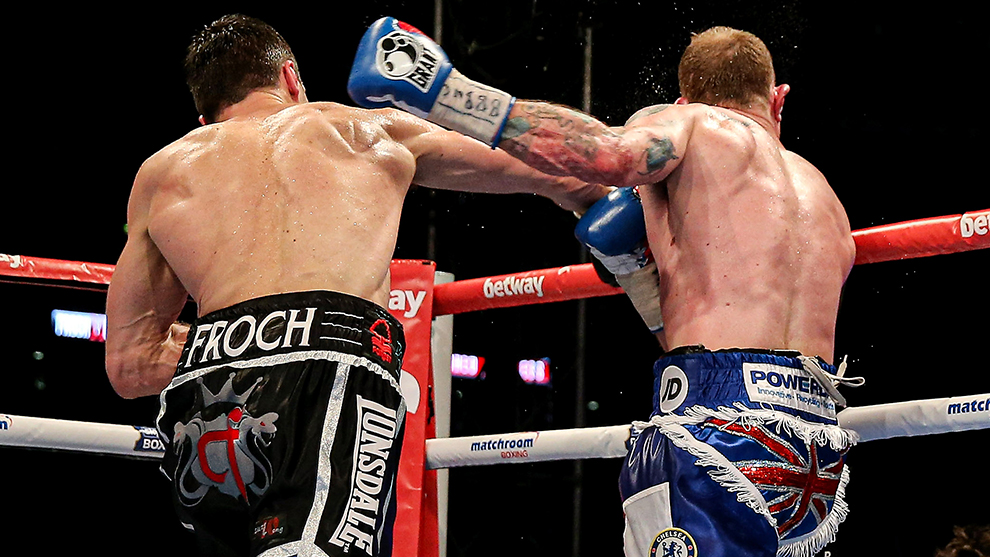
Scott Heavey/Getty Images captures the moment when Froch successfully connects with the decisive right hand.
The conclusion, undoubtedly, was as definitive as conclusions can be; the ultimate conclusion, some may say, that the rivalry demanded. However, sitting to the right of the press row, I could still hear two elegantly dressed women carefully examining the aftermath, both uncertain if their desires had been completely fulfilled despite the chaos. They were cautious not to let the falling ticker-tape become entangled in their hair as they observed Groves catching his breath on his stool. One of them turned to the other and inquired, “Did you find it enjoyable, dear?”
“Indeed,” responded the other, “it was decent, I guess. However, it would have been better if there were more impactful blows. He only took one hit and that was the end of it.”
“Yes. I’d have liked to see him take a few more big hits before going down as well. It happened very fast. Too fast.”
The rivalry can be described as being centered around three powerful punches – two in the first fight and one in the second. However, it abruptly ended in front of an audience that craved, fantasized, and anticipated a much lengthier spectacle. This audience, largely indifferent to the fighters’ welfare or future, only sought to satisfy their twisted desires by witnessing a certain quota of brutal strikes.
If you have any doubts, just take a moment to observe the reactions of the crowd during replays of the knockout punch. The big screens incite whooping, hollering, and enthusiastic gestures like high-fives and seal-claps from those who are excited by powerful punches and intense falls. If you turn around, you might even witness intoxicated individuals playfully recreating the final blow on one another, resulting in spilled beer. Furthermore, you can overhear self-proclaimed experts explaining to each other how they would have avoided the devastating right hand by Froch. One person boldly suggested, “He should have kept his hands up,” while others went as far as booing and hurling insults at the young boxer who had to wear an oxygen mask. This young boxer’s courage that night was only matched by his opponent’s.
Without a doubt, when Carl Froch gently placed his left glove on George Groves’ shoulder, drawing him near and whispering words of meager solace, it became apparent that the bruised duo were the only compassionate souls amidst the crowd of 80,000 in the Colosseum.
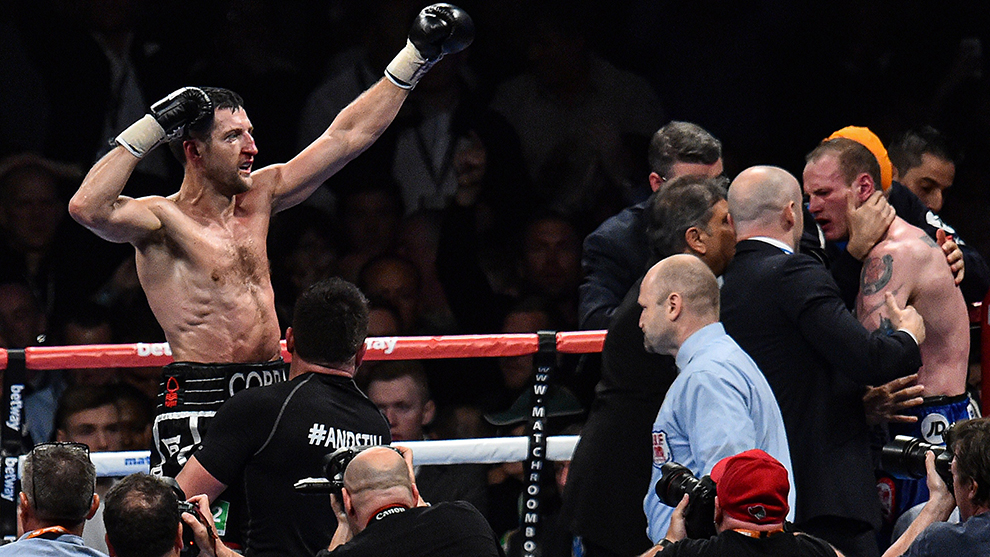
As Groves is consoled, Froch rejoices in celebration.
PART VI
In September, following their disappointing performance at the 2014 World Cup, the England football team played a meaningless friendly against Norway at Wembley Stadium. The stadium was only partially filled, and among the attendees was George Groves, who was invited as a guest. Like many others, he grew bored and left during halftime, despite witnessing England secure a 1-0 victory. Before the match began, George was spotted guiding his wife, Sophie, down the Wembley steps. As they admired the immaculate turf, George pointed to a specific spot in the distance with his right hand and shared a smile with Sophie. He remarked, “Do you see that spot over there, Soph? That’s where I suffered a knockout a few months ago.”
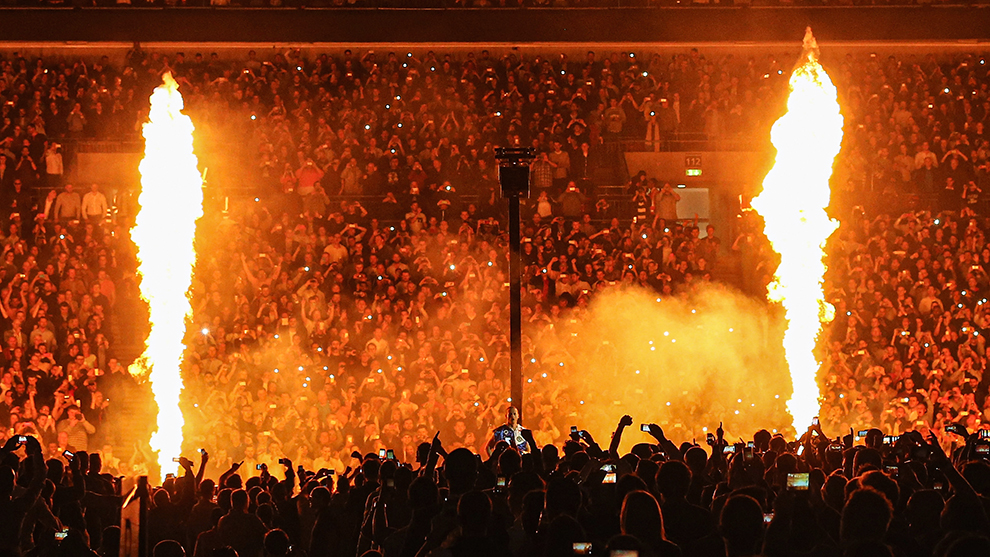
Groves lived through the entire fire walk on that eventful May night.
PART VII
Forty years before Froch vs. Groves II, another fighter named George was dropped in the eighth round by a right hand he never saw coming. He, too, probably felt he was winning the fight at the time (he wasn’t), and landing the heavier blows (questionable), and applying effective aggression (ineffective aggression would be more apt). Yet nothing, in the end, could interrupt or prevent what Muhammad Ali did to an exhausted George Foreman in Kinshasa, Zaire.
The defeat, Foreman’s first as a pro, would haunt him for years. It would motivate him to take the whole of 1975 off and would be the cause of a great, unshakeable depression. Of all the people to lose against, he thought, why that son of a bitch? He’d never hear the end of it, he feared. There would be reminders on every television screen and on every page of every newspaper and magazine. The punch, the fall, the putdowns, the chants, the history; it would all combine to add layer upon layer to Ali’s already considerable legacy and, in turn, compound Foreman’s enduring misery. They’d even probably make films about it. Books and all, each casting Foreman, this once-fearsome destroyer who bounced Joe Frazier off the canvas like a basketball, as the lumbering fool who fell for the “rope-a-dope”, the oldest trick in the book; duped not by “The Greatest” but by a supposedly old, slowing, and fading underdog.
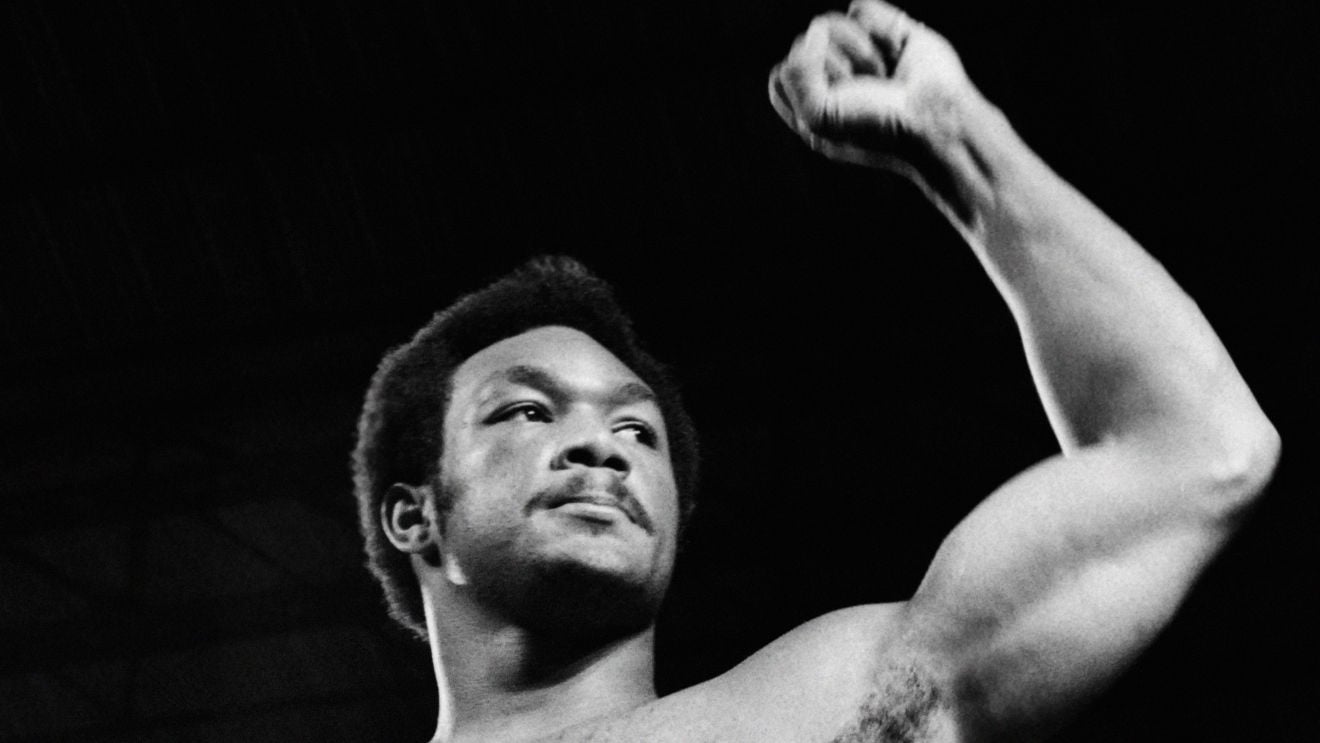
George Foreman, pictured in this image, has been featured in STR/AFP via Getty Images.
Fortunately, in 1977, after yet another defeat, this time at the hands of the skilled Jimmy Young, Foreman declared that he had a life-altering religious encounter in his dressing room. This profound experience led him to retire from boxing at the rather youthful age of 28, although only for a period of ten years. By 1980, Foreman had indeed transformed into an ordained minister, resulting in the blessings of acceptance and forgiveness.
Foreman reflected on his experience preaching on the streets nationwide, expressing how nobody acknowledged his presence. He made a decision to alter his appearance by cutting his hair and removing his moustache. However, one evening as pedestrians passed him by, he decided to announce his true identity. “Yes, I’m George Foreman! I’m the individual who was defeated by Muhammad Ali!” he proclaimed while preaching. This proclamation caught people’s attention, causing them to stop in their tracks. Although they were unaware of his identity, they returned to him, seeking confirmation. It was at that moment that Foreman realized the significance of his name and his connection to Muhammad Ali and their historic match, “The Rumble in the Jungle,” which greatly aided his ministry. Consequently, Foreman now takes immense pride in that boxing match with Muhammad Ali.
Along similar lines, Foreman’s publicist back then, Bill Caplan, once relayed a story to me about Big George that I later relayed to another George I believed could benefit from hearing it. It went something like this: “There’s a very famous picture of Ali knocking Foreman down in Zaire where he’s got one arm in the air and he’s kind of spiralling down to the floor. It was a ‘double truck’ in Sports Illustrated, which means two pages in the centre of the magazine. When people used to come up and ask George for his autograph, sometimes they’d bring that magazine and ask him to sign it and he’d say, ‘Oh please, I’ll sign anything but that photo. Give me something else.’ He’d say it good-naturedly, but he meant it.
During one day, he graciously showed me around his incredibly stunning home, which he and his wife actively collaborated with the architect to create. We eventually entered his office, where I noticed a massive monitor attached to his computer, displaying a familiar picture as his screensaver. Astonished, I couldn’t help but exclaim, “George, that’s the very picture you claimed you’d never autograph, and now it graces your screensaver on this magnificent 52-inch monitor! I’m genuinely taken aback!” With a humble smile, he replied, “I gaze at that image every single day, and it serves as a reminder to stay grounded.”
As George Groves drove home from the gym one afternoon in January, he patiently listened to the story. However, he knew just as well as I did that there was no need for him to be humbled at that stage. It had only been seven months since his defeat by Carl Froch’s right hand in Wembley Stadium, but in some ways, he didn’t even require reassurance. Nevertheless, I still glanced at Groves, hoping to see a sign that he was listening, understanding the meaning behind the words, relating to them, and assuring me that he would be okay. Unfortunately, no such sign was given.
According to Joyce Carol Oates, boxing revolves around failure more than success. This truth was accepted by one George, while the other George, a young challenger for a world title, was too inexperienced and passionate to comprehend it. Knowing this, I decided not to mention the quote to him, instead letting George Groves talk about his admiration for Muhammad Ali. It seemed like a simpler approach, at least for the time being.

Caption: George Groves embracing retirement (Image credit: David M. Benett/Dave Benett/WireImage)
